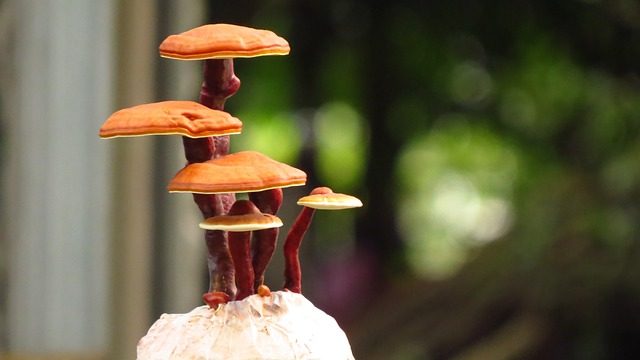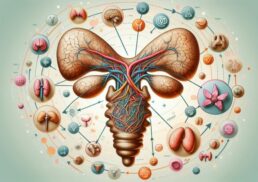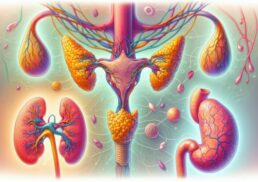Reishi mushroom, a powerful medicinal fungus, has been revered for its incredible health-promoting properties for over 2000 years. Known for its potential to boost the immune system, support cancer treatment, and improve heart health and blood sugar, this ancient remedy has stood the test of time. Are you ready to unlock the secrets of reishi mushroom and discover how it can benefit your health?
Table of Contents
Key Takeaways
Reishi Mushroom is a powerful medicinal fungus with numerous health benefits, including immune system support and potential cancer treatment.
Reishi mushroom has antioxidant properties that may help reduce depression, fatigue, and anxiety as well as potentially protect against chronic diseases.
Consultation with a healthcare professional is advised before taking reishi mushroom due to side effects or interactions with other medications.
Reishi Mushroom: A Powerful Medicinal Fungus

Ganoderma lucidum, more commonly known as reishi mushroom, is a medicinal fungus that has been used in traditional Chinese medicine for centuries. It is packed with a variety of bioactive compounds, including ganoderma lucidum polysaccharides peptide, which contribute to its numerous health benefits. From supporting the immune system to potentially aiding cancer treatment, ganoderma lucidum inhibits proliferation of harmful cells, making fermented mushroom ganoderma lucidum a focus of scientific research as we strive to understand its full potential. As one of the most well-known medicinal mushrooms, ganoderma lucidum mycelia suppresses the growth of these harmful cells, further emphasizing the importance of incorporating ganoderma lucidum dietary supplements, such as reishi mushroom extract and powdered whole reishi mushroom, into your daily routine to experience these health advantages.
Reishi, or lingzhi as it is known in China, is rich in essential nutrients such as:
protein
carbohydrates
fiber
vital minerals like potassium, calcium, and magnesium
With its array of health-promoting properties, it’s no wonder that this glossy-surfaced mushroom has been revered as a symbol of longevity and well-being.
The History and Origins of Reishi Mushroom
Originating in China and Japan, reishi mushroom has been recognized as a medicinal mushroom for over 2000 years. Its therapeutic properties, such as:
enhancing vital energy
strengthening cardiac function
increasing memory
promoting anti-aging effects
have been documented in ancient scripts like the Shen Nong Materia Medica, written approximately 2,000 years ago.
Reishi mushroom held a prominent place in ancient Chinese and Japanese cultures, where it was widely regarded as the ‘herb of spiritual potency.’ Herbalists utilized it to promote health, longevity, and bolster the immune system. Even today, it is commonly referred to as the ‘mushroom of immortality,’ owing to its numerous potential health benefits.
Immune System Support with Reishi Mushroom
The reishi mushroom is widely recognized for its immune-boosting abilities. Studies suggest that it can modulate white blood cells and inflammation pathways, thereby enhancing immune function and potentially safeguarding the body against diverse illnesses and diseases.
Cytokine induction, immunological effector enhancement, and gene expression activation underpin the reishi mushroom’s immunomodulatory effects. These features position the mushroom as a potent aid in fostering a robust immune system and overall health.
Immunomodulation Effects
Reishi mushroom achieves its immunomodulation effects via diverse mechanisms. It amplifies the activity of cell surface receptors, prompting the release of inflammatory cytokines, vital for triggering and managing the immune response. Consuming reishi mushroom also activates immune-associated genes, amplifying its immunomodulatory impact.
These immunomodulatory features position reishi mushroom as a hopeful contender for bolstering the immune system. It could potentially assist the body in fending off infections and maintaining a healthy immune cell balance. Given its role in shaping immune responses, reishi mushroom emerges as a potent asset for enhancing overall health.
Reishi Mushroom and Cancer Treatment

Studies exploring the potential anticancer properties of reishi mushroom have yielded promising results. While these findings necessitate further validation, preliminary evidence suggests that reishi mushroom could aid cancer patients, including those with prostate cancer cells, by boosting white blood cell activity and curbing tumor growth.
Beyond its anticancer potential, reishi mushroom displays indirect antitumor mechanisms, including modifying the host immune system and immunomodulatory effects, alongside direct anticancer activity like using ganoderma lucidum polysaccharide extract. These traits render reishi mushroom a potential adjuvant therapy for cancer patients, though healthcare professional consultation is advised before incorporating it into a treatment regimen.
Supporting Cancer Patients
Cancer patients, including those with bladder cancer cells and breast cancer cells, may find supplementary support in reishi mushroom supplements by way of enhanced immune system and overall well-being. Studies have shown that reishi mushroom can augment immune response and invigorate the activity of cancer-combating lymphocytes, potentially aiding in cancer treatment.
Furthermore, cancer patients may experience additional benefits from reishi mushroom, including enhanced strength and stamina, lower cholesterol levels, and antioxidative protection. Like with any supplement, it’s recommended to consult a healthcare professional before integrating reishi mushroom into a cancer treatment regimen.
Heart Health, Blood Sugar, and Reishi Mushroom
Potential benefits of reishi mushroom may extend to heart health and blood sugar regulation. Some studies indicate that reishi mushroom can decrease blood pressure and enhance blood sugar regulation, though these benefits require further research confirmation.
The hypoglycemic effect of reishi mushroom has been demonstrated in animal studies, indicating its potential to help regulate blood sugar levels. Furthermore, reishi mushroom’s potential impact on heart health, such as reducing reperfusion injuries, cholesterol levels, and blood pressure, showcases its potential to support overall cardiovascular wellness.
Lowering Blood Pressure
Some studies suggest that reishi mushroom may interact with medications that lower blood pressure, slow blood clotting, or lower blood sugar levels. As such, it is essential to consult a healthcare professional before starting any reishi mushroom supplement, especially if you are taking medications for these conditions.
Reishi mushroom may have a negative interaction with medications that slow blood clotting (anticoagulant/antiplatelet drugs) and medications for diabetes (antidiabetes drugs). Therefore, caution is advised when considering incorporating reishi mushroom into your health regimen, particularly if you are on any medications that may interact with it.
Antioxidant Properties and Other Health Benefits
Renowned for its antioxidant properties, reishi mushroom can offer several health benefits, including alleviating symptoms of depression, fatigue, and anxiety in individuals with specific medical conditions. Antioxidants serve to shield cells from free radical damage, potentially preventing the onset of cancer and other chronic diseases.
Research has shown that antioxidants from reishi mushroom are quickly absorbed upon ingestion, leading to an increase in the plasma total antioxidant activity of human subjects. By providing antioxidant protection, reishi mushroom may contribute to the overall health and well-being of individuals.
Reducing Depression, Fatigue, and Anxiety
Reishi mushroom’s antioxidant effects could contribute to alleviating depression, fatigue, and anxiety in individuals with specific medical conditions. It has been shown to modulate the release of mood-influencing stress hormones and enhance energy levels. Its compounds may also interact with serotonin receptors, crucial for mood regulation.
While the exact mechanisms underlying the potential of reishi mushrooms to reduce depression and anxiety remain unclear, the evidence suggests that its antioxidant properties may help reduce oxidative stress, which is correlated with depression and anxiety. Further research is required to gain a more comprehensive understanding of the mechanisms behind these effects.
Side Effects, Safety, and Precautions
Although generally deemed safe, reishi mushroom can provoke side effects in some individuals, including:
Dizziness
Dry mouth
Itching
Nausea
Rash
Before starting any reishi mushroom supplement, it’s advisable to consult a healthcare professional to confirm its safety and establish appropriate dosage.
Reishi mushroom should be avoided during pregnancy and breastfeeding, as its safety during these periods has not been well-established. Additionally, it is advised that individuals with certain bleeding disorders should avoid high doses of reishi mushroom, as it may increase the risk of bleeding.
Pregnancy, Breastfeeding, and Reishi Mushroom
Reishi mushroom may increase the risk of bleeding in people with bleeding disorders and those undergoing surgery, so caution is advised. It is recommended to consult a healthcare professional before using reishi mushroom during pregnancy and breastfeeding, as there may be potential risks associated with its consumption.
Furthermore, reishi mushroom may interact with certain medications, such as anticoagulants or immunosuppressants, so it is essential to consult with a healthcare professional before using reishi mushroom if you are taking any of these medications.
Dosage and Forms of Reishi Mushroom
The dosage of reishi mushroom depends on the form it is used in, with whole mushrooms typically providing higher doses than extracts. It is important to consult a healthcare provider to ensure the proper dosing of reishi mushroom, as individual needs may vary depending on factors such as age, weight, and specific health conditions.
Taking reishi mushroom is easy, as it is available in various forms such as capsules, powders, and tinctures, making it simple to incorporate into your daily routine. However, it is essential to follow the recommended dosage guidelines provided by a healthcare professional to ensure the safe and effective use of reishi mushroom supplements.
Interactions with Other Medications
Potential interactions may arise between reishi mushroom and certain medications. Thus, it’s advisable to consult a healthcare professional prior to starting any reishi mushroom supplement. The mushroom may interact with medications slowing blood clotting (anticoagulant/antiplatelet drugs) and diabetes medications (antidiabetes drugs).
It is also important to be cautious when combining reishi mushroom with chemotherapy drugs, as there may be potential risks, such as increased bleeding and enhanced effects of anticoagulant medications. As with any supplement, always consult with a healthcare professional before incorporating reishi mushroom into your health regimen, particularly if you are taking medications that may interact with it.
Learn more, visit 6 Benefits of Reishi Mushroom (Plus Side Effects and Dosage).
Summary
In conclusion, reishi mushroom is a powerful medicinal fungus with a long history of promoting health and longevity. Its potential benefits include supporting the immune system, aiding cancer treatment, improving heart health and blood sugar levels, and providing antioxidant protection. However, it is essential to consult a healthcare professional before using reishi mushroom to ensure its safe and effective use, particularly if you are pregnant, breastfeeding, or taking medications that may interact with it. By incorporating reishi mushroom into your wellness routine, you may unlock its numerous health-promoting properties and experience its ancient wisdom firsthand.
Frequently Asked Questions
What is reishi mushroom good for?
Reishi mushroom is a popular fungus used in Eastern medicine, offering multiple health benefits, such as boosting the immune system, reducing stress, improving sleep, and lessening fatigue. It may also be able to decrease the size and number of tumors in certain types of cancer. Additionally, it has been shown to improve the quality of life for some people with cancer.
Who should not eat reishi mushroom?
Pregnant and breastfeeding women, people with low blood pressure or certain bleeding disorders, those undergoing surgery, people with allergies to mushrooms or fungal products, and those taking therapy to raise their blood pressure or diabetes medications should avoid taking reishi mushrooms.
How does reishi make you feel?
Reishi mushrooms can help promote relaxation, drowsiness, and a calming effect through the presence of natural sedatives called triterpenes and by interacting with the GABA pathway.
Can reishi mushroom help with cancer treatment?
Studies have suggested that reishi mushroom may have potential anticancer properties, such as increasing white blood cell activity and reducing tumor growth. However, further research is needed to confirm these benefits.
Is reishi mushroom safe during pregnancy and breastfeeding?
It is advised to avoid consuming reishi mushroom during pregnancy and breastfeeding, as its safety during these periods has not been well-established.









